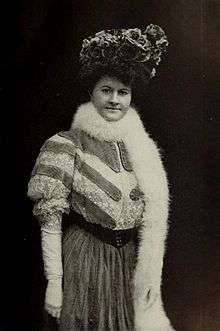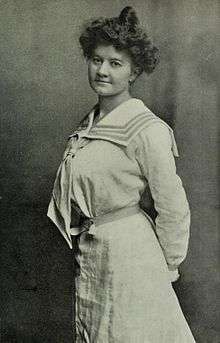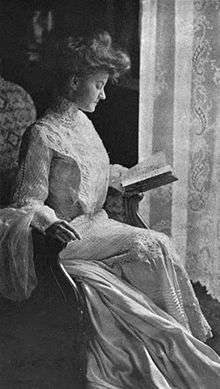Ellen Glasgow
| Ellen Glasgow | |
|---|---|
 Portrait of Ellen Glasgow, by Aimé Dupont | |
| Born |
Ellen Anderson Gholson Glasgow April 22, 1873 Richmond, Virginia |
| Died |
November 21, 1945 (aged 72) Richmond, Virginia |
| Occupation | Novelist |
|
| |
| Signature |
|
Ellen Anderson Gholson Glasgow (April 22, 1873 – November 21, 1945) was an American novelist who portrayed the changing world of the contemporary South.
Biography
Born into an elite Virginia family in Richmond, Virginia, the young Glasgow developed in a different way from that traditional to women of her class.[1] Due to poor health, she was educated at home in Richmond. She read deeply in philosophy, social and political theory, and European and British literature.[2] She spent her summers at her family's Bumpass, Virginia, estate, the historic Jerdone Castle plantation, a setting that she used in her writings. Her father, Francis Thomas Glasgow, was the son of Arthur Glasgow and Catherine Anderson. He was raised in Rockbridge County, Virginia, and graduated from Washington College, now Washington and Lee University, in 1847.
Glasgow's maternal uncle, Joseph Reid Anderson, graduated fourth in his class of 49 from West Point in 1836. On April 4, 1848, he purchased the Tredegar Ironworks in Richmond. When news of the secession reached Richmond, Anderson promptly joined the Army of Northern Virginia, achieving the rank of general. General Robert E. Lee asked him to return to Tredegar Ironworks to manage the manufacturing on which Lee's victory would depend. Francis Glasgow later managed the Tredegar Iron Works. Glasgow thought her father self-righteous and unfeeling.[3] But, some of her more admirable characters reflect a Scots-Calvinist background like his and a similar "iron vein of Presbyterianism."[4]
.jpg)
Her mother was Anne Jane Gholson, born on December 9, 1831, at Needham, Virginia and died on October 27, 1893. She was the daughter of William Yates Gholson and Martha Anne Jane Taylor. She was the granddaughter of Congressman Thomas Gholson, Jr. and Anne Yates, and a descendant of Rev. William Yates, the College of William & Mary's fifth president (1761–1764).[5] Gholson was also a descendant of William Randolph, a prominent colonist and land owner in the Commonwealth of Virginia. He and his wife, Mary Isham, were referred to as the "Adam and Eve" of Virginia.[5]
Anne Gholson married Francis T. Glasgow on July 14, 1853, and they had ten children together. Anne Gholson was inclined to what was then called "nervous invalidism"; some attributed this to her having borne and cared for ten children.[6] Glasgow also dealt with "nervous invalidism" throughout her life.
As the United States women's suffrage movement was developing in the early 1900s, Glasgow marched in the English suffrage parades in the spring of 1909. Later she spoke at the first suffrage meeting in Virginia.[7] Glasgow felt that the movement came "at the wrong moment" for her, and her participation and interest waned.[8] Glasgow did not at first make women’s roles her major theme, and she was slow to place heroines rather than heroes at the centers of her stories.[9] Her later works, however, have heroines who display many of the attributes of women involved in the political movement.
Glasgow died on November 21, 1945,[10] and is buried in Hollywood Cemetery, Richmond, Virginia.
Relationships
Glasgow had several love interests during her life. In The Woman Within (1954), an autobiography written for posthumous publication, Glasgow tells of a long, secret affair with a married man she had met in New York City, whom she called "Gerald B."[11] Ellen also maintained a close lifelong friendship with James Branch Cabell, another notable Richmond writer. She was engaged twice but did not marry. One fiancé, the prominent attorney and Republican Party leader Henry W. Anderson, collaborated with Glasgow and provided copies of his speeches for her novel The Builders.[12] Glasgow felt her best work was done when love was over.[13]
Reception and honors
In 1923 a reviewer in Time characterized Glasgow:
"She is of the South; but she is not by any manner of means provincial. She was educated, being a delicate child, at home and at private schools. Yet she is by no means a woman secluded from life. She has wide contacts and interests. . . . Here is a really important figure in the history of American letters; for she has preserved for us the quality and the beauty of her real South." [14]
Glasgow's papers reside at the Albert and Shirley Small Special Collections Library at the University of Virginia. Additionally, copies of Glasgow's correspondence may be found in the Marjorie Kinnan Rawlings papers at the George A. Smathers Libraries Special Collections at the University of Florida. Marjorie Kinnan Rawlings was gathering information for her requisitioned biography of Ellen Glasgow prior to her death.[15] Glasgow was a member of the inaugural class of Virginia Women in History in 2000.[16]
Works

Glasgow's first novel, The Descendant (1897) was written in secret and published anonymously. She destroyed part of the manuscript after her mother died in 1893. The work was delayed after her brother-in-law and intellectual mentor, George McCormack, died the following year. It was not until absorbing the losses of these two deaths that she returned to her novel, completing it in 1895.[17] The novel features an emancipated heroine who seeks passion rather than marriage. Although it was published anonymously, the novel's authorship became well known the following year, when her second novel, Phases of an Inferior Planet (1898), announced on its title page, “by Ellen Glasgow, author of The Descendant.”
By the time The Descendant was in print, Glasgow had finished Phases of an Inferior Planet.[18] The novel portrays the demise of a marriage and focuses on "the spirituality of female friendship."[19] Critics found the story to be "sodden with hopelessness all the way though,"[20] but "excellently told."[21] Glasgow stated that her third novel, The Voice of People (1900) was an objective view of the poor-white farmer in politics.[22] The hero is a young Southerner who, having a genius for politics, rises above the masses and falls in love with a higher class girl. Her next novel, The Battle-Ground (1902), sold over 21,000 copies in the first two weeks after publication.[23] It depicts the South before and during the Civil War and was hailed as "the first and best realistic treatment of the war from the southern point of view."[24]
The Deliverance (1904) and her previous novel, The Battle-Ground, were written during her affair with Gerald B. They "are the only early books in which Glasgow's heroine and hero are united" by the novels' ends.[25]
Glasgow's next four novels were written in what she considered her "earlier manner" [26] and were received with mixed reviews. The Wheel of Life (1906) sold moderately well based on the success of The Descendant. Despite its commercial success, however, reviewers found the book disappointing.[27] Set in New York, the story tells of domestic unhappiness and tangled love affairs.[28] It was unfavorably compared to Edith Wharton's House of Mirth, which was published that same year. Most critics recommended that Glasgow “stick to the South.”[29] Glasgow regarded the novel a failure.[30]

The Ancient Law (1908) portrayed white factory workers in the Virginia textile industry,[31] and analyzes the rise of industrial capitalism and its corresponding social ills.[32] Critics found the book to be overly melodramatic.[33] With The Romance of a Plain Man (1909) and The Miller of Old Church (1911) Glasgow began concentrating on gender traditions; she contrasted the conventions of the Southern woman with the feminist viewpoint,[34] a direction which she continued in Virginia (1913).
In Virginia (1913) the title protagonist is a southern lady whose husband abandons her when he achieves success. The protagonist in Life and Gabriella (1916) is also abandoned by a weak-willed husband, but Gabriella becomes a self-sufficient, single mother who remarries well by the end of the novel. Glasgow published two more novels, The Builders (1919) and One Man in His Time (1922), as well as a set of short stories (The Shadowy Third and Other Stories (1923)), before producing the novel of greatest personal importance, Barren Ground (1925).
In this novel, Glasgow felt she had successfully reversed the traditional seduction plot by producing a heroine completely freed from the southern patriarchal influence. She believed that writing Barren Ground, a “tragedy,” also freed her for her comedies of manners The Romantic Comedians (1926), They Stooped to Folly (1929), and The Sheltered Life (1932). These late works are considered the most artful criticism of romantic illusion in her career.[35]
Glasgow produced two more "novels of character",[36] The Sheltered Life (1932) and Vein of Iron (1935), in which she continued to explore female independence.
In 1941 she published In This Our Life, which won the Pulitzer Prize for the Novel in 1942. In addition, it was quickly bought by Warner Brothers and adapted as a movie by the same name, released in 1942.
Her autobiography, The Woman Within, published after her death, details her progression as an author and the influences essential for her becoming an acclaimed Southern woman writer.
Select bibliography
| Library resources about Ellen Glasgow |
| By Ellen Glasgow |
|---|
Novels
- The Descendant (1897)
- Phases of an Inferior Planet (1898)
- The Voice of the People (1900)
- The Battle-Ground (1902)
- The Deliverance (1904)
- The Wheel of Life (1906)
- The Ancient Law (1908)[37]
- The Romance of a Plain Man (1909)
- The Miller of Old Church (1911)
- Virginia (1913)
- Life and Gabriella (1916)
- The Builders (1919)
- The Past (1920) [ghost story, part of The Shadowy Third collection]
- One Man In His Time (novel) (1922)
- Barren Ground (1925)
- The Romantic Comedians (1926)
- They Stooped to Folly (1929)
- The Sheltered Life (1932)
- Vein of Iron (1935)
- In This Our Life (1941) Pulitzer Prize for the Novel 1942 filmed in 1942 as In This Our Life by John Huston.
Collections
- The Shadowy Third and Other Stories (1923) [38]
- The Collected Stories of Ellen Glasgow (12 stories (pp. 24–253), with an introduction by the editor (pp. 3–23))[39]
Autobiography
- The Woman Within (published posthumously in 1954)[40]
Notes
- ↑ Inge, 883
- ↑ Heath
- ↑ Glasgow 12-3
- ↑ Glasgow 14
- 1 2 Roberts, Gary Boyd (2007). "Descendants of William Randolph and Henry Isham of Virginia". Retrieved 2010-04-09.
- ↑ Goodman, 19
- ↑ Glasgow 185-6
- ↑ Glasgow 186
- ↑ Pannill 686
- ↑ Inge 884
- ↑ Glasgow, 156
- ↑ John T. Kneebone et al., eds., Dictionary of Virginia Biography (Richmond: The Library of Virginia, 1998- ), 1:136-137.
- ↑ Glasgow, 243-244
- ↑ TIME, 26 Nov 1923
- ↑ Silverthorne, Elizabeth. Marjorie Kinnan Rawlings: Sojourner at Cross Creek. Woodstock, New York: Overlook Press. p. 3.
- ↑ "Virginia Women in History". Lva.virginia.gov. Retrieved 2016-12-13.
- ↑ Publishers' Online, May 17, 2009
- ↑ Glasgow 129
- ↑ Matthews 33, 36
- ↑ Scura 21
- ↑ Scura 31
- ↑ Glasgow 181
- ↑ Goodman 89
- ↑ Raper 150
- ↑ Wagner 31
- ↑ Raper 237
- ↑ Raper 227
- ↑ Scura 102
- ↑ Raper 228
- ↑ Wagner 37
- ↑ Raper 231
- ↑ Goodman 107
- ↑ Scura 129, Wagner 36
- ↑ Wagner 38
- ↑ Pannill
- ↑ Wagner 119
- ↑ "Review: The Ancient Law by Ellen Glasgow". The Athenaeum (4196): 380. March 28, 1908.
- ↑ Bleiler, Everett (1948). The Checklist of Fantastic Literature. Chicago: Shasta Publishers. p. 127.
- ↑ Meeker, Richard (1963). The Collected Stories of Ellen Glasgow. Baton Rouge: Louisiana State University Press.
- ↑ Yardley, Jonathan (29 November 2003). "'Woman Within': An Unlikely Rebel of the Privileged South". The Washington Post.
References
- Auchincloss, Louis. Ellen Glasgow. Vol. 33. Minneapolis: University of Minnesota Press, 1964.
- Becker, Allen Wilkins. Ellen Glasgow: Her Novels and Their Place in the Development of Southern Fiction. Baltimore, MD: Johns Hopkins University Master's Thesis, 1956.
- Cooper, Frederic Taber. Some American Story Tellers. New York: H. Holt and Company, 1911.
- Donovan, Josephine. After the fall the Demeter-Persephone Myth in Wharton, Cather, and Glasgow, University Park: Pennsylvania State UP, 1989.
- Godbold, Jr., E. Stanley. Ellen Glasgow and the Woman Within, 1972.
- Goodman, Susan. Ellen Glasgow: A Biography. Baltimore:Johns Hopkins University Press, 1998.
- Holman, C. Hugh. Three Modes of Modern Southern Fiction: Ellen Glasgow, William Faulkner, Thomas Wolfe. Vol. 9. Athens: University of Georgia Press, 1966.
- Inge, M. Thomas, and Mary Baldwin College. Ellen Glasgow: Centennial Essays. Charlottesville: University Press of Virginia, 1976.
- Inge, Tonette Bond. Encyclopedia of Southern Culture, ed. Charles Reagan Wilson and William R. Ferris. Chapel Hill: University of North Carolina Press, 1989.
- Jessup, Josephine Lurie. The Faith of our Feminists. New York: R. R. Smith, 1950.
- Jones, Anne Goodwyn. Tomorrow Is Another Day: The Woman Writer in the South, 1859-1936, 1981.
- MacDonald, Edgar and Tonette Blond Inge. Ellen Glasgow: A Reference Guide (1897–1981), 1986.
- Mathews, Pamela R. Ellen Glasgow and a Woman's Traditions, 1994.
- McDowell, Frederick P. W. Ellen Glasgow and the Ironic Art of Fiction. Madison: University of Wisconsin Press, 1960.
- Pannill, Linda in The Heath Anthology of American Literature, Vol. D. eds
- Patterson, Martha H. Beyond the Gibson Girl: Reimagining the American New Woman, 1895-1915. Urbana: U of Illinois Press, 2005.
- Publishers' Bindings Online. Accessed 17 May 2009
- Raper, Julius R. From the Sunken Garden: The Fiction of Ellen Glasgow, 1916-1945. Baton Rouge: Louisiana State UP, 1980.
- Raper, Julius Rowan, and Ellen Anderson Gholson Glasgow. Without Shelter;the Early Career of Ellen Glasgow. Baton Rouge: Louisiana State University Press, 1971.
- Reuben, Paul P. "/ Chapter 7: Ellen Glasgow." PAL: Perspectives in American Literature-A Research and Reference Guide. Accessed 4 Apr 2009.
- Richards, Marion K. Ellen Glasgow's Development as a Novelist. Vol. 24. The Hague: Mouton, 1971.
- Rouse, Blair. Ellen Glasgow. New York: Twayne Publishers, 1962.
- Rubin, Louis Decimus. No Place on Earth; Ellen Glasgow, James Branch Cabell, and Richmond-in-Virginia. Austin: University of Texas Press, 1959.
- Santas, Joan Foster. Ellen Glasgow's American Dream. Charlottesville: University Press of Virginia, 1965.
- Saunders, Catherine E. Writing the Margins: Edith Wharton, Ellen Glasgow, and the Literary Tradition of the Ruined Woman. Cambridge: Harvard UP, 1987.
- Scura, Dorothy M. ed. Ellen Glasgow: The Contemporary Reviews. Knoxville: U of Tennessee Press, 1992.
- Thiebaux, Marcelle. Ellen Glasgow. NY: Ungar, 1982.
- Tutwiler, Carringon C., and University of Virginia Bibliographical Society. Ellen Glasgow's Library. Charlottesville, VA: Bibliographical Society of the University of Virginia, 1967.
- Time Magazine, 26 November 1923.
- Wagner, Linda W. Ellen Glasgow: Beyond Convention. Austin U of Texas Press, 1982.
External links
| Wikimedia Commons has media related to Ellen Glasgow. |
| Wikisource has the text of a 1920 Encyclopedia Americana article about Ellen Glasgow. |
- Works by Ellen Anderson Gholson Glasgow at Project Gutenberg
- Works by or about Ellen Glasgow at Internet Archive
- Ellen Glasgow Society
- Photos of the first edition of In This Our Life
- Friends and Rivals: James Branch Cabell and Ellen Glasgow, Online exhibition, Virginia Commonwealth University